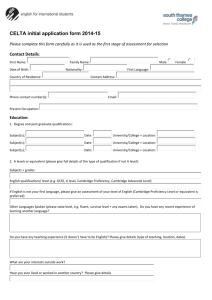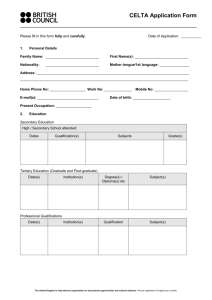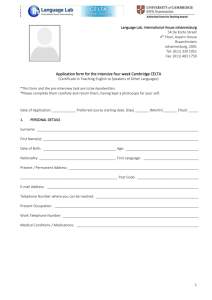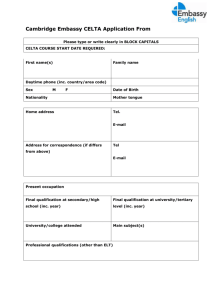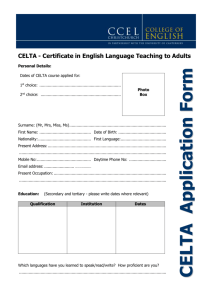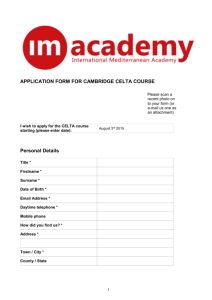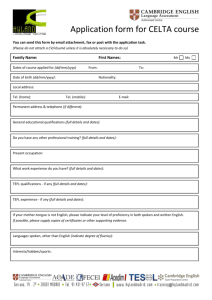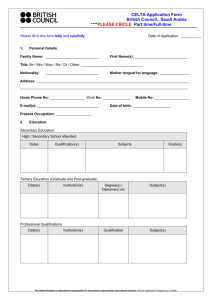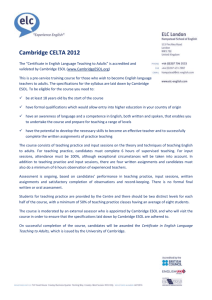CAMBRIDGE CERTIFICATE IN
advertisement
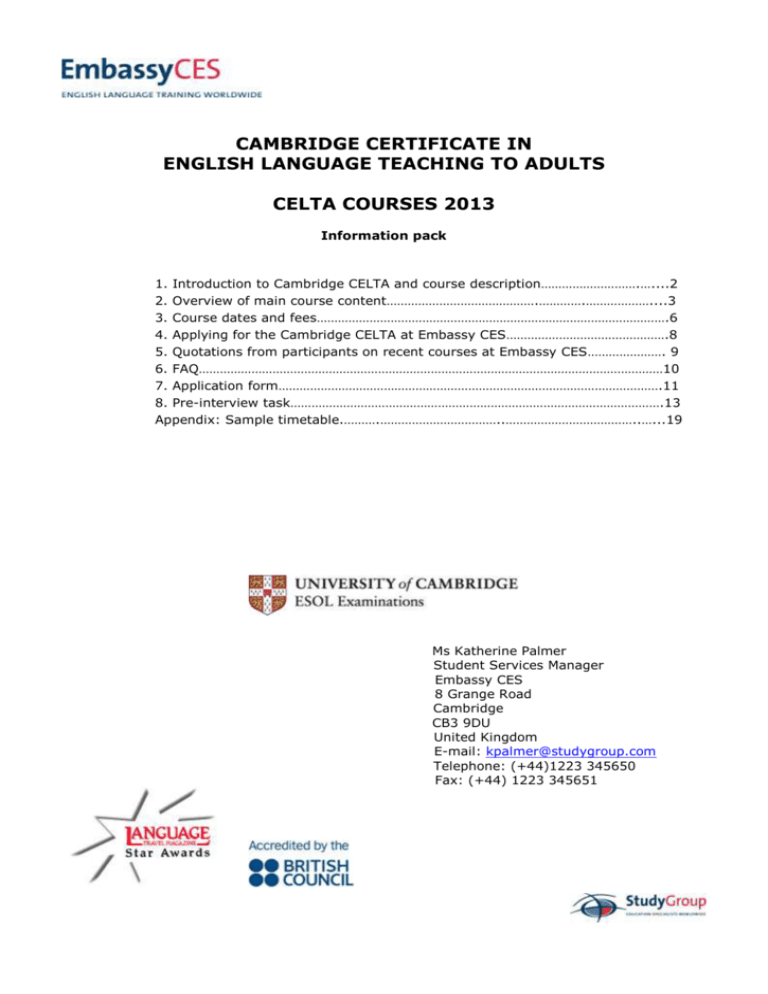
CAMBRIDGE CERTIFICATE IN ENGLISH LANGUAGE TEACHING TO ADULTS CELTA COURSES 2013 Information pack 1. Introduction to Cambridge CELTA and course description……………………….…....2 2. Overview of main course content…………………………………….………….………………....3 3. Course dates and fees……………………………………………………………………………………….6 4. Applying for the Cambridge CELTA at Embassy CES……………………………………….8 5. Quotations from participants on recent courses at Embassy CES…………………. 9 6. FAQ……………………………………………………………………………………………………………………10 7. Application form……………………………………………………………………………………………….11 8. Pre-interview task…………………………………………………………………………………………….13 Appendix: Sample timetable.……….……………………………..………………………………..…...19 Ms Katherine Palmer Student Services Manager Embassy CES 8 Grange Road Cambridge CB3 9DU United Kingdom E-mail: kpalmer@studygroup.com Telephone: (+44)1223 345650 Fax: (+44) 1223 345651 1. Introduction to Cambridge CELTA and course description University of Cambridge ESOL examinations are the world's leading range of certificates for learners of English. Each year they are taken by over 2 million people, in 130 countries. Cambridge ESOL's world-renowned Teaching Awards provide a route into the English Language Teaching career for new teachers and first class development prospects for experienced teachers. These awards are recognised worldwide. They include the Certificate in English Language Teaching to Adults (CELTA), which is the best- known and most widelytaken initial English language teaching qualification in the world. For more information about Cambridge ESOL please go to: www.cambridgeassessment.org.uk/ca/About_Us/Our_Structure/Exam_Boards/Cambridge_ESOL Embassy CES Cambridge is a long established and well-equipped Cambridge language school with an international reputation for quality courses and personal service. We teach English to adult foreign students from all over the world and prepare them for internationally recognized examinations. This course provides initial training leading to the Cambridge Certificate in English Teaching to Adults (CELTA) - the most widely-recognised international professional qualification for English language teachers. Candidates are usually university graduates or qualified teachers, but must have a minimum standard of education that would allow entry to Higher education in their country. You need not have English as your first language provided that your awareness and competence in written and spoken English enables you to follow the course without hindrance. This will be evaluated as part of the interview process. The minimum age requirement is 18. 2 2. Overview of main course content Language awareness: how English works, basic concepts and terms used to describe form and meaning in language and language use, language skills, and syllabus design Learning and teaching: educational backgrounds and traditions of learners, motivations, different learning styles. The principles and practical realities of planning for effective teaching; selecting and adapting materials for learning activities and tasks Classroom management: teaching skills, classroom presence and control, monitoring and evaluation. Resources and materials: selection, use and evaluation of commercial and non-published resources. Professional development as a teacher: self assessment of strengths and weaknesses, working as teacher, colleague, employer. The 4-week course is intensive, and requires a full-time commitment. Lectures, workshops and observation of experienced teachers take up roughly half the contact time. Teaching practice takes up the other half, and is conducted in small groups with a teaching practice supervisor. During the course you will be observed by two tutors. Teaching practice includes guided preparation of the lesson to be taught, and classroom teaching practice followed by analysis, reflection and feedback. Completion of lesson planning and the four set written assignments take place outside course contact time. Individual and group tutorials are held to monitor and discuss progress. A generous amount of supervised lesson planning (SLP) time supports the trainees with adequate staging and designing the lessons. Input sessions Each morning there are usually two or three workshops or seminars in which all course participants are together. These sessions are essentially practical, looking at ideas that you can immediately use in the classroom. For example, in the first week you might have seminars on "Ideas for teaching grammar", "Using a text in class" and "Introduction to language analysis". The seminars are mainly on 3 teaching methodology, although some sessions will focus on participants' awareness of the English language. Lesson observation Part of the morning programme will be devoted to lesson observation of experienced teachers. You'll see a normal English language class at work; which will help you to put some of what you're learning into perspective. There will be 8 hours of observation. Teaching Practice In the mornings you work as a group of up to 10 trainees. In the afternoons we split you into smaller teaching practice groups, usually with 5 trainees. Each group has a tutor whose job is to help you prepare lessons, observe your teaching and lead feedback sessions. You will teach a total of 6 hours on the course. You do not teach every day, but you will teach most days. When you are not teaching you will observe your peers teaching in order to give them helpful feedback on their own work, which, in itself will prove very instructive to you. Your students will be "real, live" foreign students in classes especially formed for the teaching practice. Typically the classes will be of mixed nationality and multilingual, mainly young adults of 18 - 26. You will teach classes of at least two different levels, including a low level. Initially you will be given a great deal of help in preparing lessons, but you will become more independent as the course proceeds. We aim for you to be reasonably independent at planning your lessons by the end of the course. TP Feedback Usually feedback on the lessons is time-tabled for the following morning (though it can also follow directly after and on the same day as Teaching Practice). This is an opportunity for you to reflect on how you taught, to listen to your peers give their views and to hear the tutor's comments. 4 The aim is to give useful feedback honestly and supportively so that you can learn from your experience and put this into practice when you prepare future classes. The tutor will also give you some detailed written feedback. Assessment There is no final written examination. Assessment is based on your performance throughout the course in the teaching practice and written assignments. Your two tutors will meet at the end of the course to determine your grade. The course is assessed in accordance with University of Cambridge Examinations Syndicate guidelines. The assessment is continuous (i.e. throughout the course) and integrated (all components count towards the final grade). The assessment is externally moderated by an assessor approved by Cambridge. Candidates whose performance meets the specified criteria are awarded a Pass. Those who demonstrate a significantly higher level of achievement in their classroom teaching skills may be awarded a Pass (Grade B). And those who, in addition to this, demonstrate a significantly higher level of achievement in relation to their lesson planning and awareness of the teaching and learning processes may be awarded a Pass (Grade A). Participants also receive a detailed teaching profile. 5 3. COURSE DATES AND FEES 2013 Embassy CES in Cambridge only offers full time courses that last for four weeks. - 25th February – 22nd March - 13th May - 8th June - 28th October – 22nd November Course fees: £1,350 Fees include: £200 deposit paid on acceptance £123 candidate entry fee Host family accommodation: £164.00 per week single room & 2 meals per day. Residential accommodation: £196.00 per week single room en suite self catering. Payment of fees Payment of all course fees must be made at least 28 days in advance of the start of the course on which the participant has reserved a place. In cash: For those paying in person, please call at the school within office hours Monday to Friday between 08:30 – 17:00. By Sterling Cheque: Cheques must be made in sterling and should be made payable to Embassy Educational Services UK Limited. By Credit Card: To make a credit card payment by phone, please call +44 (0) 1223 345650 to give your details. By Bank Transfer: Make payment to Embassy Educational Services UK Limited, National Westminster Bank PLC, 103 Church Road, 103 Church Road, Hove, East Sussex, BN3 2BS. Bank account number 01025996. Bank sort code 536102. Please note that money transfers can take some time to complete. In order to speed up the process, please specify your name, student number and invoice number. Please advise us once payment has been made by faxing, or sending, a copy of your transfer document to us along with your name and address. Please also note the following conditions: A place on the programme cannot be reserved without the payment of a deposit of £200.00 to secure your place. This deposit is non-refundable and nontransferable. The balance of the fees must be paid at least 28 days (4 weeks) before the start date of the course on which the applicant has reserved a place. In the case of cancellations being made less than four weeks before the beginning of the course on which a participant is booked, requests for refunds can only be considered if we have been able to fill the place at short notice. The deposit is not refundable. Applicants are advised to insure against the enforced cancellation or curtailment of their participation on the course in the event of illness or injury. In case of curtailment, fees cannot be transferred or refunded. Please note that acceptance of a place on the CELTA will indicate an acceptance of all conditions outlined above. 7 4. APPLYING FOR THE CAMBRIDGE CELTA Your first step is to complete the application form and the pre-interview task and return them to the school: The enclosed application form (see 7. below) The enclosed CELTA pre-interview task (see 8. below) You may return the application form and pre-interview task by email to Katherine Palmer kpalmer@studygroup.com or by post, to Embassy CES, 8 Grange Road, Cambridge CB3 9DU. Once we have received your application, we will arrange an interview for you with one of the course tutors. In certain cases, we can arrange a phone interview but a face to face interview is preferred. The aim of the interview is to find out if the course is right for you and if, in terms of knowledge and skills, you are likely to be successful on it. If both you and the interviewer are satisfied, then we will offer you a place. For many courses there is a considerable demand for places. You are welcome to phone in and find out about the availability of dates. 5. QUOTATIONS FROM PARTICIPANTS ON OUR RECENT COURSES These quotes are from written feedback given by participants at the end of recent Certificate courses: "Very intensive, stimulating, encouraging & down-to-earth" "I rate it very highly" "I found the course consistently challenging. I feel satisfied that I have learnt as much about teaching as I could have learnt in one month." "Super tutors - well-qualified and experienced." "An excellent course - well thought out and put together - well presented." "I found the tutors both empowering and extremely helpful. Their sole concern, it seemed to me, was to serve my development as an effective TEFL teacher." "Very enjoyable" "The course fulfilled my highest expectations" "When I was choosing a TEFL course I selected your institute because of reputation. course outshone my expectations." "A great course in every respect." "The students were lovely and there is a great atmosphere in the school" "Very professional" "What a team!" "I got much more than I expected" "Probably one of the biggest learning experiences of my life." “Very motivating” “I can do nothing but wholeheartedly recommend this course” The 6. FAQ What is CELTA? CELTA is an initial qualification for people with little or no previous teaching experience and opens up a whole world of exciting teaching opportunities. Because it is awarded by Cambridge ESOL, part of the world-famous University of Cambridge, you can rely on its quality and recognition. Over 10,000 people successfully complete a CELTA course each year. How does CELTA relate to TEFL/TESOL? 'TEFL' or 'TESOL' are terms often used to describe qualifications for English Language teachers. CELTA, the most widely taken initial TESOL/TEFL qualification of its kind in the world, was previously known as CTEFLA and the 'RSA certificate'. Who is CELTA for? CELTA is suitable for a wide range of people. It is the ideal qualification for those who want to start English language teaching anywhere in the world. It is also suitable for people who want a career break or change and for those already teaching English who have no formal qualification. Who recognises CELTA? CELTA is accepted throughout the world by organisations which employ English Language teachers. The Cambridge CELTA has been accredited by Ofqual (the Office of the Qualifications and Examinations Regulation) at Level 5 on the National Qualifications Framework for England. Cambridge ESOL also works with international ELT organisations to ensure the acceptance of CELTA globally. Am I eligible to apply? Ideally you should: have a standard of education equivalent to that required for entry into higher education be aged 18 or over have a standard of English which will enable you to teach at a range of levels. Centres may still accept you if you do not have formal qualifications at this level but can demonstrate that you would be likely to complete the course successfully. How do I apply? CELTA courses are designed by individual centres, based on specifications produced by Cambridge ESOL. They are available at over 286 approved centres in 54 countries, providing almost 900 CELTA courses every year. 7. APPLICATION FORM Please type or write clearly in BLOCK CAPITALS CELTA COURSE START DATE REQUIRED: First name(s) Family name Daytime phone (inc. country/area code) Sex M F Date of Birth Nationality Mother tongue Home address Tel. E-mail Address for correspondence (if differs Tel from above) E-mail Present occupation Final qualification at secondary/high Final qualification at university/tertiary school (inc. year) level (inc. year) University/college attended Main subject(s) Professional qualifications (other than ELT) 11 Career experience English language teaching profile (teaching experience and courses attended to date) Foreign languages other than English (indicate your level) English language level if English is not your mother tongue Please write about your level & confidence in English English language examinations you have passed - include date & grade/score Cambridge CPE TOEFL Cambridge CAE IELTS Cambridge FCE Other Any disabilities or health problems? Yes / No (If Yes- please give details) ACCOMMODATION REQUIRED? Type: Self-catering Yes / No Guesthouse hotel host family Special accommodation needs? Do you smoke? Yes / No Will you have a car with you? Yes / No How did you hear about CELTA? I have read and agree to the course terms in Section 3 of the information pack. Signed …………………………………………………………………………… 12 8. PRE-INTERVIEW TASK Part One It is highly recommended to use a grammar book to help you answer these questions. For the language analysis task we recommend using Practical English Usage by Michael Swan, Oxford University Press and English Grammar in Use by Raymond Murphy, Cambridge University Press; for methodology we suggest Learning Teaching by Jim Scrivener, Macmillan. It is acceptable to use the internet, but please make sure you use a reliable source. Please name the sources you have used: …………………………………………………………… ……………………………………………………………………………………………………………………………….. 1. They 2. Label the part of speech for each of the words in the following sentence made their way slowly across the deserted square (i) What is the difference in meaning between the following sentences? (ii) Identify the grammatical structure underlined in each sentence (a) When I arrived at the station the train left (b) When I arrived at the station, the train was leaving (c) When I arrived at the station the train had left (a) She had her house painted (b) She had painted her house (a) He stopped to smoke a cigarette (b) He stopped smoking cigarettes (a) You must see him (b) You must have seen him 3. Spot the mistake in the following sentences and correct it. (a) I have 25 years (b) Borrow me your pen, will you? (c) I like my coffee too hot (d) Can you remember me to go to the bank? (e) I’m feeling nervous about my exam tomorrow (f) I am absolutely agree with you (g) You must precise your destination (h) She remarked a suspicious looking man in the doorway (i) It’s not sure it’ll rain today (j) I’m boring with this exercise 14 Part Two Choose five adjectives of more than one syllable that describe your personality. For each adjective mark the stressed syllable - as in these examples: creAtive adAptable 1. 2. 4. 5. 3. 15 Part Three In everyday English the sentence "What are you going to do?" could be pronounced something like "Whataya gonna do?" or "Whatcha gonna do?" Make an argument for and/or against teaching foreign students this pronunciation. Consider their needs as speakers, listeners, writers and readers. Part Four Use a chart or diagram to represent your progress through your career and/or life to date. The choice of design and what information you include or leave out is entirely up to you - but find some way to give us a sense of who you are and what you've done. 17 Part Five Please write a short composition (200 words approx) in answer to the question below. Please write complete sentences and paragraphs - don't use note form. Please describe what you would like to do if you pass, and which aspects of the course you think you will find most challenging. Please also mention your present occupation and your most recent qualifications. 18 Sample CELTA Course Timetable WEEK 1 Monday Tuesday Wednesday Thursday 9.30 Course Orientation & Language Lesson 9.30 Teaching a skill 1: Reading 9.00 Observation 1 9.50 Phonology 1 11.00 11.00 9.00 Form, Function, Meaning, Use & Phonology Setting up first assignment 10.30 8.45 Pre-course task review + question time 9.30 Clarifying Meaning 11.00 11.30 Role of the Teacher & Learners’ Needs 11.30 Teaching Vocabulary 1 / Visual Aids 11.05 Observation 2 11.55 Giving Instructions 11.30 Introduction to Lesson Planning 1.00 1.00 12.30 1.00 2.00 Supervised Lesson Planning (SLP) 3.00 3.00 Classroom tasks: Whiteboard / Tape recorder + Video Viewing Task Vocab. teaching 4.00 3.30 Trainees testing + Meeting students and assisting w. marking 2.00 10.50 Coffee break 11.30 Ways of staging a Language Focus Lesson 1.00 Lunch break 2.00 SLP SLP 3.15 3.30 Teaching Practice (TP) Feedback 3.15 3.30 2.00 Friday 1.45 SLP 3.15 3.30 SLP 2.15 2.30 TP TP TP Feedback Feedback Feedback WEEK 2 Monday Tuesday Wednesday Thursday Friday 9.30 9.00 9.30 Setting up & Exploiting Tasks Reflection on teaching & learning 11.00 Coffee break 11.30 Free Production / Speaking Skills 9.00 9.30 1.00 Lunch break 1.45 Delayed Feedback 2.15 SLP 3.15 3.30 TP 12.45 Controlled practice activities Observation 3 & 4 11.00 10.35 11.30 LI Factors and Correction 11.00 Teaching a skill 2 Listening 1.00 12.30 2.15 SLP 3.15 3.30 TP 1.45 Delayed Feedback 2.15 SLP 3.15 3.30 TP Writing skills Vocabulary 2 10.30 11.00 11.00 Observations 5 & 6 11.30 Stage 2 Tutorials (including delayed feedback) + ULP 1.45 Delayed Feedback 2.15 SLP 3.15 3.30 TP WEEK 3 Monday Tuesday Wednesday 9.30 The Learner & the Learning Context 11.00 9.30 Phonology 2: Stress 11.30 Present Forms & Aspect 11.30 Identifying Teaching Points for final phase of TP 1.00 9.30 9.30 Integrated skills/ Conditional / Authentic Hypothetical Forms materials 11.00 11.00 Coffee break 11.30 11.30 Exploiting course Video Observations books 7&8 1.00 2.15 SLP 3.15 3.30 11.00 1.00 Thursday 1.00 1.45 Delayed Feedback 2.15 SLP Lunch Break 1.45 1.45 Delayed Feedback Delayed Feedback 2.15 2.15 SLP SLP 3.15 3.30 3.15 3.30 TP With new group TP 3.15 3.30 TP Friday 9.30 Past Forms 11.00 11.30 Stage 3 tutorials (if needed) + Delayed Feedback 1.00 ULP 2.30 TP Immediate Feedback after TP TP WEEK 4 Monday Tuesday Wednesday Thursday Friday 9.30 Modal Verbs 9.30 Phonology 3 9.30 Types of Syllabus 9.30 Final Administration; Using the Internet 11.00 11.00 11:30 Roleplay 11.30 Future Forms 11.30 Literacy Skills 1.00 1.00 11.00 Coffee break 11.30 Devising Tests for EFL 1.00 Lunch break 1.45 Delayed Feedback 2.15 ULP 3.15 3.30 TP 9.30 Careers in TEFL / Professional Development 11.00 11.30 Course Feedback & Goodbyes 1.00 2.15 ULP 3.15 3.30 TP 1.45 Delayed Feedback 2.15 ULP 3.15 3.30 TP 1.00 1.45 Delayed Feedback 2.15 ULP 3.15 3.30 TP Immediate Feedback after TP 11.00
